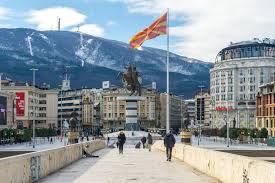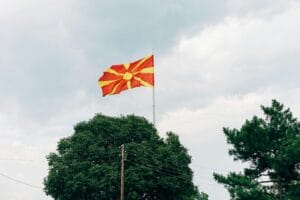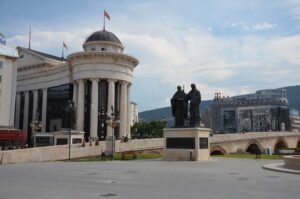On Wednesday 8 May, Macedonian citizens went to the polls for crucial parliamentary and second-round presidential elections. As already expected in polling towards 8 May, conservative right-wing party VMRO-DPMNE took a large win over the ruling social democratic SDSM party. The results and expectations for government formation foreshadow a bumpy EU future for North Macedonia.
Results of Parliamentary Elections
During the parliamentary elections, 123 seats of the Macedonian Assembly, the ‘Sobranie’, were chosen. With a turnout of 55.44%, the coalition ‘Your Macedonia’, led by VMRO-DPMNE won big with 43.32% (58 votes) – winning 14 over last elections in 2020. The SDSM-led coalition ‘For a European Future’ took 15.37% (18 seats), 28 less than previous elections in 2020. See the figure below for all results, also of other coalitions (with 95.3% counted).
For SDSM, the result is its worst-ever since it was formed in 1991. The slow pace of EU integration and allegations of corruption are perceived to be key reasons of the defeat. Due to North Macedonia’s electoral system, SDSM will become the third political force with 18 seats, also behind DUI’s ‘European Front’ (19 seats). Another ethnic Albanian coalition next to European Front, VLEN, won 13 seats. New political movements ZNAM an Levica took the rest of the mandates, each taking 6 seats. It causes North Macedonia to have one of the more fragmented parliaments in history, moving away from the SDSM and VMRO-DPMNE duopoly.
SDSM leader Dimitar Kovacevski reacted that “today’s result is disappointing. The Social Democrats have suffered a strong blow”. He added that there must be no deviation from North Macedonia path to the EU: “If we miss that chance, we could lose another decade, maybe even another generation,” he said, adding that could lead to falling living standards and increased ethnic tensions, and could “expose us to a security risk that none of us can understand how big it could be.”
VMRO-DPMNE party head Hristijan Mickoski named the election results a “historic victory for North Macedonia and the people of Macedonia.”
Results of Presidential Elections
After no candidate took a majority of votes in the first-round, Gordana Siljanovska-Davkova (VMRO-DPMNE) and Stevo Pendarovski (SDSM) went head-to-head on the 8 May run-off. Siljanovska-Davkova took a resounding victory, with 69.01% of votes, versus 30.99% for Pendarovski. It means that VMRO-DPMNE will deliver the first ever female head-of-state in North Macedonia. Turnout was 47.47%. The role of the President is mostly ceremonial, with most of the legislative power in North Macedonia being in the hands of the Prime Minister and its parliament. However, the President is the commander-in-chief of the armed forces and the first body for performing foreign affairs.
EU Candidacy as key factor in the elections
EU accession has been the major political issue in North Macedonia since the country was granted candidate status in 2005. Although support for joining remains high, the slow and frustrating road towards accession talks has significantly increased disillusionment with the EU among Macedonians.
A general slowdown of EU enlargement has been felt not only by North Macedonia but by many aspiring EU nations. North Macedonia faced additional hurdles in the form of opportunistic demands relating to longstanding disputes with its direct neighbours. The power of the EU veto was used by both Greece and Bulgaria to force concessions from the Macedonians. The Greeks disputed the name “Macedonia” and were able to effectively force through a name-change. Bulgaria pushes for a constitutional change recognising a Bulgarian minority in North Macedonia while also advising the EU not to recognise the Macedonian language, instead branding it as a Bulgarian dialect. The veto was eventually lifted, allowing accession negotiations to start in July 2022. The constitutional changes, however, remain a requirement for EU accession.
This has put the ruling SDSM party in a difficult political predicament. They have indicated their willingness to change the constitution but failed to acquire a two-thirds parliamentary majority needed to do so. Meanwhile, VMRO-DPMNE explicitly opposed further constitutional changes. Many Macedonians, perceive the compromise with Greece as unjust and the demands from Bulgaria have only heightened concerns, particularly among conservative factions. The extent to which Macedonian national identity should be sacrificed for EU membership was a key issue in the elections.
VMRO-DPMNE has capitalized on this unease, actively campaigning on a platform of preserving Macedonian identity and resisting foreign demands. This stance has significantly contributed to the party’s popularity, contrasting with the SDSM coalition’s approach of advocating for compliance with Bulgaria’s demands and previously endorsing the name change.
State of the economy and corruption
As much attention was focused on the EU negotiations, domestic concerns have been overlooked. Economic performance has been sluggish for years and the country has experienced a significant brain drain. The bad state of public health care, neglected infrastructure and high employment reflect badly on the SDSM coalition’s capacity to govern.
Corruption has been rampant for years and many high-level public officials have been implicated. A recent EU report indicates that no progress has been made in this area. Generally, Macedonians believe corruption to be widespread in their country, both in the public and private sector. Delays and reversals of corruption trials as well as the reduction of maximum penalties suggests that the judiciary is at the very least grossly ineffective in dealing with the problem. Several corruption scandals surrounding senior SDSM officials have badly tainted the reputation of the party.
Election Observation
The joint ODIHR international election observation mission said that “North Macedonia’s presidential run-off and parliamentary elections were competitive and an extensive and pluralistic campaign helped voters to make an informed choice”. ODIHR officials added that “the elections were marred by negative rhetoric with nationalistic slogans, as well as shortcomings in the legislation and insufficient oversight of campaign finances”. “These elections were competitive and well run, particularly given the challenge of organizing two different elections at the same time,” said Jillian Stirk, who headed the ODIHR’s election observation mission. “But the negative rhetoric and increasingly nationalistic undertones of some parties and candidates were extremely worrying, and the campaign would have benefited from more detailed oversight. During and after the voting, the State Electoral Commission of North Macedonia, its Interior Ministry and the Prosecutor’s Office evaluated that the country had an orderly voting process – only administering a few minor incidents and technical problems.
Cabinet formation
The most likely governing coalition will be VMRO-DPMNE, together with VLEN/VREDI and possibly ZNAM, having a strong majority of 77 seats. Most likely PM will be VMRO-DPMNE party leader Hristijan Mickoski. Mickoski became the new party leader after the resignation of Nikola Gruevski in 2017. Mickoski has close ties with the Hungarian and Serbian presidents Orban and Vučić. He claims to be pro-EU and pro-NATO, but not with ‘capitulation’.
VMRO-DPMNE is a political force in North Macedonia since 1990. The party is the main right-wing, nationalist force and governed for years in a row, most notably under Nikola Gruevski between 2006 and 2016. Gruevski, currently in exile in Hungary, put the party on an ultranationalist, Eurosceptic, pro-Russian and pro-Serbian course. The Gruevski administration was involved in large scandals, varying from corruption, clientelism and state grab of the judiciary, media, election observation and other democratic institutions. After large-scale protests, Gruevski has been succeeded as party head by Mickoski. VMRO-DPMNE is still rallying anti-European sentiment in the country, strongly opposing any international deals that may bring the country forward in its EU trajectory. Close ally Viktor Orbán already welcomed the results, saying that he is “looking forward to working together on giving new momentum to the EU accession process of North Macedonia”. It is expected that a Mickoski-government will oppose any negotiation with Bulgaria on constitutional changes – advocating a removal of Bulgaria’s veto in the EU process. Moreover, it remains to be seen whether a VMRO-DPMNE government will uphold the Prespa Agreement with Greece, possibly sparking a new crisis with its southern neighbour over the country’s name change to ‘North Macedonia’. Moreover, a VMRO-DPMNE government is likely to align with autocratic tendencies such as Hungarian and Serbian counterparts – only putting the country further from its EU trajectory and trying to externalise the blame for why the process is not moving forward.
Possible coalition partners are ZNAM – a new-found party of former SDSM members that identify themselves as a nationalistic party with a left-wing economic orientation – and VLEN/VREDI, an Albanian minority party that claims to be “the legitimate representatives of the Albanians in the next government” – hoping to but rivals DUI out of government, after they governed for 16 years in a row.
Since the elections
Since 8 May, several political developments already took place. On May 11, first talks took place between VMRO-DPMNE and VLEN/VREDI on a possible coalition. “European integration, economic development, the rule of law and the fight against crime and corruption will be the main pillars of the work of the new government”, is stated in the joint communiqué after the meeting. Leaders of the two political camps have announced that, starting next week, the talks will continue between the working groups “on all issues until the finalization of the talks on co-governance”.
Next to the start of coalition talks, new President Siljanovska-Davkova immediately caused diplomatic unrest, referring to “Macedonia” instead of “North Macedonia” at her inauguration on Sunday May 12. Greek Ambassador Philippidou immediately left the ceremony and EU Commission President Von der Leyen reacted that “for North Macedonia to continue its successful path on EU accession, it is paramount that the country continues on the path of reforms and full respect for its binding agreements, including the Prespa Agreement.” Siljanovska-Davkova later said she will “respect” the name change that removed the Greek veto “but I will not use it.”



